- Home
- Clive Barker
Days of Magic, Nights of War Page 14
Days of Magic, Nights of War Read online
Page 14
Hadn’t Vivien told her that the phantom message writer in Room Nineteen had written HIGHER GROUND?
It was a warning. Of course it was. Higher Ground! Higher Ground! How could everyone (herself included) have been so dense? The ghost in the Comfort Tree Hotel knew what it was talking about! There was water out there, somewhere. Maybe an underground river of some kind locked in the rock, straining to be free. Or maybe something stranger? It didn’t really matter now. What mattered was to spread the warning, beginning with Vivien.
She turned her wheelchair away from the window. Her breath was suddenly hard to catch, and her arms felt leaden.
“Calm down, Lavinia,” she told herself quietly. “Just . . . calm yourself down; you’re having a panic attack. Breathe, Lavinia. Breathe.”
But the advice did no good. A terrible burning pain had begun in the middle of her chest, like the worst heartburn imaginable. She let out a little sob of complaint and threw her desperate gaze back toward the open window, wondering if there was any way she could call for help from there. It was certainly closer than the telephone. But her arms were suddenly too heavy to lift. And the pain in her chest was unendurable. She just wanted it to stop, even if that meant her long life was now at an end. Better that than a moment more of this unendurable agony.
“Enough,” she said through gritted teeth. “Please . . . enough.”
Her heart heard her words, and it did her the great kindness of obeying. The pain went out of her as suddenly as it had come. She issued one last, grateful breath. Then she was gone.
Chapter 20
Malingo Alone
IN THE WEEKS SINCE Candy had helped Malingo slip out of Kaspar Wolfswinkel’s clutches and escape the prison island of Ninnyhammer, the geshrat had scarcely ever been without her company. And he’d been very grateful for that fact. Even in dreams they’d been close. It was a cornerstone of geshratian belief that sleep did not separate friends and loved ones, but instead brought their slumbering souls closer to one another. Hence the familiar geshrat wishes as they parted for bed; not “good night” or “sweet dreams,” but “See you sleeping.”
Now, however, Candy had gone, and Malingo was left alone. Not literally, of course. He had people pressing in on him from every side—singing, dancing, hooting and hollering, all having the time of their lives. But their high spirits only served to make Malingo feel lonelier. For the first couple of hours after Candy had disappeared into the darkening sky in the grip of the zethek, he stood at the edge of the bustling crowd, pressed against the fence that kept the unwary from stepping over a cliff and falling into the sea. Behind him, people pushed and shoved, eager to be on to the next attraction.
“Rude, rude, rude,” Malingo muttered to himself. “If Candy were here, we wouldn’t be knocked around like this!”
Finally he became so irritated by the way people were pushing he decided to find himself a more comfortable place to stand. With great difficulty he turned against the living tide and attempted to press through the crowd. On the far side of the throng he could see food stalls. He imagined buying a thick slice of Spakean flan at one of them, sprinkled liberally with sugar-loon spice, and his appetite made him impatient. He raised his voice:
“Can I get through, please? I just want to— Please! Will you all just GET OUT OF MY WAY!”
His shouting drew a few irritated stares, but the crowd continued to surge on by, preventing him from taking so much as a single step away from the fence. He knew from his weeks traveling with Candy what she would do in such a situation. She’d just press on forward, and not take no for an answer. So that was what he did. He put his hands together and took a deep breath, as though he were about to take a dive, then pressed into the crowd of people.
He chose a bad moment. Three large Hobarookians, all wearing big purple noopus furs as waistcoats, and striped hats, were swaggering past, and they didn’t take kindly to anybody getting in their way.
“Hey, geshrat-dog! Don’t you even think of steppin’ there.”
“You tell him!”
“I hate geshrats!”
“Hate ’em!”
“Didn’t you hear us, idjit? You’re in our way.”
All thoughts of Spakean flan had gone out of Malingo’s head. All he could think of now was the way he was being treated by these bullies. It made his blood boil.
“All right,” he said, deliberately standing in the Hobarookians’ path, his fists raised. “Which one of you is going to be first?”
The trio laughed, and the smallest of the three (who was still six inches taller than Malingo) gave him a hefty shove in the middle of his chest. He stumbled backward, coming within reach of the largest of the thugs, who also gave him a shove.
“How ’bout we just knock the li’l twitch around?” the big one said. “Me, den Spittel, den Slegm, den me again.”
“Oh yeah,” said Slegm, the short one. “You mean like a game! Good one, Snut!”
The crowd had quickly cleared to give the Hobarookians plenty of space to torment their new toy. Nobody raised a voice, much less a hand, to stop this thuggery. Snut pushed Malingo back into the embrace of Spittel, who turned him around, punched him and then threw him back to Slegm, who slapped him back and forth across his face. None of the blows were particularly hard, but they reminded Malingo of his time under Kaspar Wolfswinkel’s cruel thumb, when every day brought blows and insults and humiliations. Candy had saved him from all of that, of course. And it was Candy who’d taught him that he need never live in fear again.
“I have faith in you,” she’d said to him, over and over. She’d meant it too.
“Wot you doin’, geshrat?” said Snut.
“He’s finkin’, dat’s wot he’s doin,” Spittel said. “He’s finkin’ ’bout how much his nose hurts.”
In fact Malingo was doing more than thinking. He was conjuring. At the back of his head he turned over some secret words that he remembered from a book in Wolfswinkel’s library: Essential Conjurations for Hand-to-Hand Combat.
How did the rhyme begin? Something about feathers. No, not feathers. Feather-steel! That was it —
Spittel kicked Malingo’s legs from under him, and down he went. Face to the dust, he spoke the conjuration in a whisper.
“Cover me from
Scalp to sole,
In the feather-steel
That—”
Oh Lordy Lou, the rest of the words escaped him. What were they? Meanwhile, the Hobarookians had become bored with their game of Pass the Geshrat. Slegm started to kick Malingo. A small crowd had finally started to form around the four figures. People were treating this as though it were just another entertainment. And still the Hobarookians kicked and kicked. Malingo tried to put the pain out of his head and concentrate on the conjuration. How did it finish?
“Cover me from
Scalp to sole,
In the feather-steel . . .”
What about the feather-steel? What about it?
Then the words leaped onto his lips, out of nowhere.
“—That Nazrat stole!”
“What did you say?” said the Hobarookian called Spittel. He caught hold of Malingo and hauled him to his feet. “What was that?”
“Nothing,” Malingo said.
“Nothing?” said the Hobarookian. “I’ll give you nothing! Hit him, Snut!”
“Well, hold him still.”
“He is still. Hit him.”
Snut delivered a blow to Malingo’s stomach. But the conjuration was in place. It was feather-steel he struck, and it was enough to break all the bones in his hand. He yelled and fell to his knees, nursing his broken digits. In the moment of confusion Malingo spoke a second spell:
“Hear the hatred?
Hear the drums?
On your own heads,
The beating comes.”
Nobody heard him utter a word. The crowd was too busy shouting. One little child, raised up on his father’s shoulders, started to chant:
“Blood! Blo
od! Blood! Blood!”
Slegm, meanwhile, had caught hold of Malingo and yelled to Spittel. “They want blood! Let’s give ’em blood.”
Spittel grinned. “My pleasure,” he said, and threw a blow in Malingo’s direction. Somewhere between its origin and its destination, however, it got turned around and came right back at the brute, who found himself being pounded by his own fist.
He let out a howl as the blows landed, one after the other. The crowd was very amused.
“You’re doing this!” Slegm said, pushing Malingo from him. “You filthy magic man.” He threw two punches of his own at Malingo, but both landed on his own jaw.
“This is better than the shows!” Somebody in the crowd laughed.
The three Hobarookians, even the wounded Snut, were so furious at this humiliation that they began to throw blows willy-nilly, all of which came back and struck them. The crowd cheered every blow and laughed at every new bruise. They were too interested in the violence to notice Malingo creeping away. Nor did they notice a length of blue fabric that dropped out of the sky, unfurling close to the geshrat.
“Quickly!” said a woman’s voice.
He turned around and for a moment he seemed to see a face there in the folds of the blue fabric.
“Move yourself!” the woman’s voice said. “Grab hold of the cloth!”
He didn’t need telling twice. As he did so, he looked back at the crowd to find that Slegm had finally shaken off the force of Malingo’s enchantment and was making his way toward Malingo, spitting blood along with oaths of the foulest kind.
“I’m ready!” Malingo said to the woman in the blue cloth.
“Hold on,” she said. “This is going to be quite a ride!”
At that moment Slegm reached out and caught hold of Malingo’s shirt.
“Gotcha!” he yelled.
The blue cloth was meanwhile wrapping itself more tightly around Malingo’s hand and wrist, solidifying its hold.
And then it lifted him into the air.
Slegm held on for the first ten feet of the flight. Then Malingo’s shirt began to tear, and with one final curse he let his quarry go and dropped back down to the ground.
Malingo didn’t look down. He just hung on to the billowing fabric as it rose like a great blue sail. He could hear the din of the crowd below him—exclamations of surprise and disbelief. But after a little time the makeshift kite he was clinging to changed direction, and the crowds and the light and the noise faded away, and the only sounds he could hear were the whistle of the wind and the woman’s voice, humming some calming song.
Chapter 21
Night Conversations
CHRISTOPHER CARRION HAD RETURNED from the Pyramids of Xuxux to the fortress of Iniquisit on Gorgossium with a great deal to occupy his thoughts. It was clear from his encounter with the sacbrood in the tombs that the hive he’d created was volatile. Not only were the sacbrood intelligent, but they were ambitious too, and their egg-laying capabilities made them formidable. Naively he had assumed that they would be passive players in the deadly game he was about to play and would be easily manipulated. But now he saw the error of that assumption. They had their own agenda. He could no more trust them than he could trust Leeman Vol, who had spent the voyage back to Gorgossium plucking tiny red lice from his scalp and whispering to them. Carrion didn’t ask what he was talking to them about, much less whether they were answering him.
Vol revolted him. Had he not needed the man’s skills as a translator, he would undoubtedly have thrown him overboard and not thought twice about it. But he could not afford to lose Vol from his entourage, especially now that he had seen how powerful and numerous the sacbrood had become. It would be a different story when the war was over and won. Not only did he plan to exterminate every last occupant of the sacbrood hives, he would make sure Vol perished too.
He did his best to put thoughts of Vol and the sacbrood out of his head once he got back to the Twelfth Tower. Here, where the walls were covered with doodlings and carvings he’d made as a child, he felt comforted. He sent for his loyalist servants, Baby Pink-Eye and Lazaru, to fetch his map of the islands. It was duly brought and laid out in the room. The map was round, and designed to be precisely the circumference of the tower, covering every inch of the floor of the High Chamber, thus allowing Carrion to stride over water and land like a colossus. He walked from island to island, crouching down now and then to examine the shape of a particular bay or the slope of a particular hill, all the while planning his plans.
His meditations were interrupted by the sound of barking birds, followed by an eruption of martial drums that echoed back and forth between the towers. He got up and went to the window. Far below him (thirty-seven stories, in fact), a mighty procession, illuminated by innumerable lights, was winding over the rocky landscape and through the arches that lay between the Twelfth and Thirteenth Towers. About halfway down the length of this procession, borne high on a throne set on the severed wrist of an immense mummified hand, which had somehow been given animation, was Carrion’s grandmother Thant Yeyla Carrion, commonly known as Mater Motley. She was not wasting her precious time while she traveled but was hard at work sewing by the light of flickering torches. The Prince didn’t need to wonder what she was working on; it was always the same obsessive labor. She was sewing together the skins of stitchlings, half-human sacks into which the living mud from the Todo Mines would be poured. By this means a vast army was being assembled that would in time be used to destroy the bright powers of Day, and whatever forces Day might in time assemble. It was an endeavor that had so far lasted many years, but his grandmother had let it be known that the great labor was coming to an end, and very soon the army of stitchlings would be entirely assembled. The Lord of Midnight would be their generalissimo, but their Creatrix was Mater Motley.
He descended the cold stone stairs with uncommon haste. He knew better than to leave his grandmother waiting at the tower door. Even in the best of moods she was an evil-tempered woman, quicker to take offense than he was, and quicker to punish offenders. Her presence had immediately created a state of flustered chaos in the Twelfth Tower, and it irritated him to see how many of his supposedly loyal servants had fled into the caves beneath the tower rather than risk being where Mater Motley’s homicidal gaze might alight upon them. Even the various subspecies that haunted the crawl spaces of the tower, the offspring of gargoyles and wild dogs, of snake-apes and lightning, had sought the comfort of the dungeons rather than chance being seen.
Only a youth called Letheo, a fifteen-year-old Carrion had found wandering the mud mines a year or so back and had taken under his protection, remained at the front door, unintimidated. The boy had spat on his palm, attempting to plaster back an errant lock of hair.
“Aren’t you afraid, Letheo? The old witch is dangerous. Don’t you know that?”
Letheo smiled at his savior. “I ain’t afraid of her,” he said. “I got you to protect me, boss. Anyhow, I want to see what all the fuss is about.”
“So you’ve never laid eyes on my lovely grandmother?”
Letheo shook his head, and the lick of black hair fell over his forehead again.
“Well then, you should go and let her in,” Carrion said. “It’s time you met the wickedest woman in the Abarat.”
“Is she really the wickedest?”
“Oh yes,” Carrion said, without a trace of a smile. “She’s the worst. The worst of the worst. You can’t have a reputation like hers without doing harm to deserve it. Patricide. Matricide. She’s committed them all.”
“What are all those things? Patri—”
“—cide. The murder of your father. Matricide. The murder of your mother.”
“She did that?” Letheo said, his voice softened by awe.
“Trust me . . . that’s the least of it.”
“What could be worse?”
“Infanticide?”
“Infanti— The murder of children?”
“See what a quick lear
ner you are!”
“Amazing.”
“But you remember—”
“What?”
“—where your allegiance lies, boy.”
Letheo bowed respectfully. “You are my Prince,” he said. “Always. To the end of the world.”
Carrion grinned his skeletal grin. “It’s agreed then,” he said. “To the end of the world. Take my hand on it.”
Letheo was flattered to be shaking the hand of his Lord. He took it eagerly. “To the end of the world.”
“Now. Get the door. Let the wicked woman in before she poisons our doorstep.”
Letheo went to the door and, with the silent tread of one who was born to do some harm or other, opened it. Not a moment too soon. Standing there on the tower step, her gloved hand raised in readiness to knock on the door, was one of Mater Motley’s countless maidservants, a middle-aged woman whose headdress was draped with the holy colors of scarlet and gray and whose face was marked with tattoos like shadows. All this marked her out as one of Mater Motley’s inner circle, a member of the Sisterhood of the Thread. In witching circles, this was a powerful woman.
“The Queen Mother Thant Yeyla Carrion calls on her grandson. Will you tell him—”
“I’m here, Lady Putrith,” Carrion said, stepping out of the shadows.
The tiny gray Lady Putrith proffered a tiny gray smile, which showed her sharpened teeth. “Prince,” she said, inclining her head. “Your grandmother awaits you.” She then stood aside, sweeping her voluminous cloak back with theatrical flourish, so that Carrion had easy passage.
“Letheo,” Carrion said. “Come with me.”
Boy and man stepped out into the cold darkness, Letheo trotting to keep up with Carrion as he strode along the line of Mater Motley’s drummers and incense burners and earth beaters until he reached the platform on which the old woman’s great throne was elevated. Vessels of purple-black fire, in which she occasionally soaked her needle-pricked fingers to quicken them, hovered to the left and right of her.

 The Great and Secret Show
The Great and Secret Show Coldheart Canyon: A Hollywood Ghost Story
Coldheart Canyon: A Hollywood Ghost Story Galilee
Galilee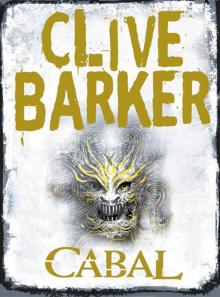 Cabal
Cabal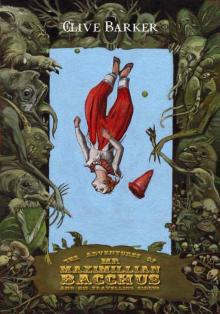 The Adventures of Mr. Maximillian Bacchus and His Travelling Circus
The Adventures of Mr. Maximillian Bacchus and His Travelling Circus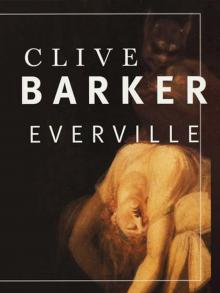 Everville
Everville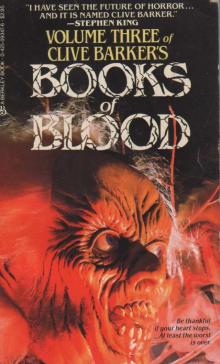 Books of Blood: Volume Three
Books of Blood: Volume Three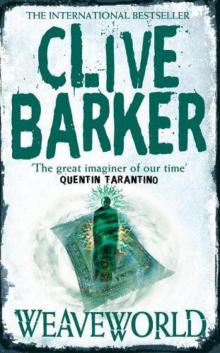 Weaveworld
Weaveworld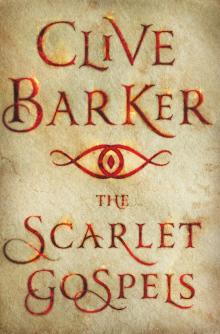 The Scarlet Gospels
The Scarlet Gospels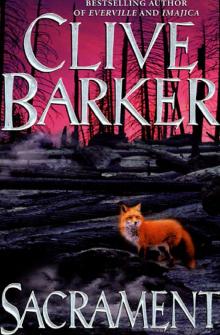 Sacrament
Sacrament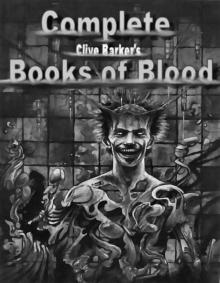 Books of Blood: Volumes 1-6
Books of Blood: Volumes 1-6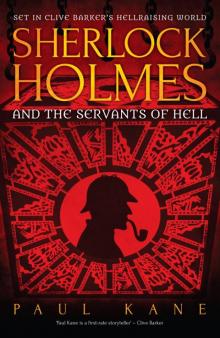 Sherlock Holmes and the Servants of Hell
Sherlock Holmes and the Servants of Hell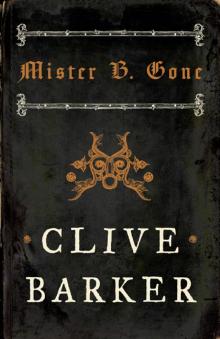 Mister B. Gone
Mister B. Gone Imajica
Imajica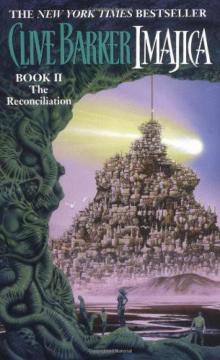 The Reconciliation
The Reconciliation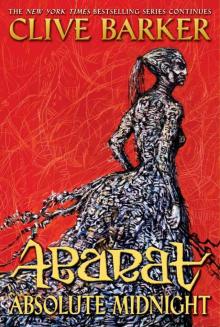 Abarat
Abarat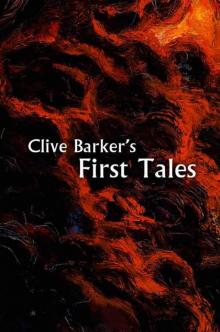 Clive Barker's First Tales
Clive Barker's First Tales The Hellbound Heart
The Hellbound Heart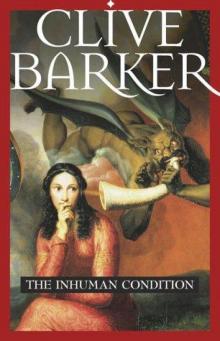 The Inhuman Condition
The Inhuman Condition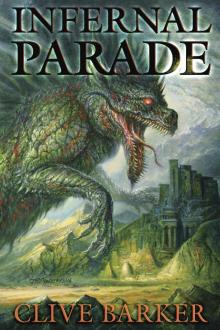 Infernal Parade
Infernal Parade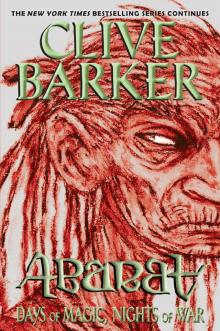 Days of Magic, Nights of War
Days of Magic, Nights of War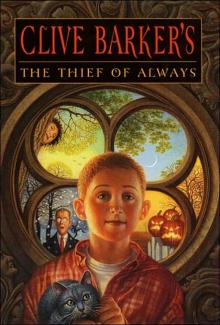 The Thief of Always
The Thief of Always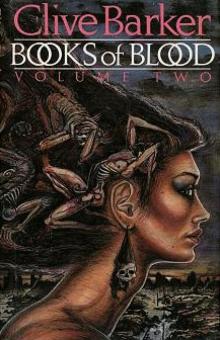 Books of Blood Vol 2
Books of Blood Vol 2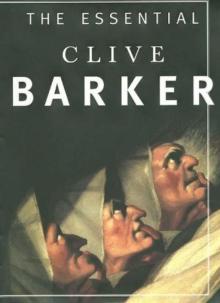 The Essential Clive Barker
The Essential Clive Barker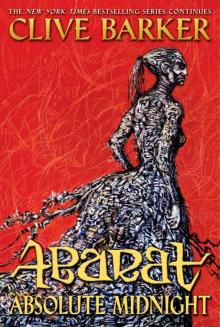 Abarat: Absolute Midnight a-3
Abarat: Absolute Midnight a-3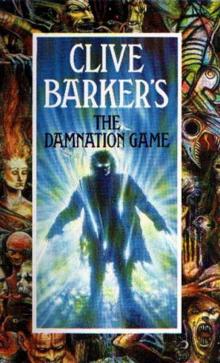 The Damnation Game
The Damnation Game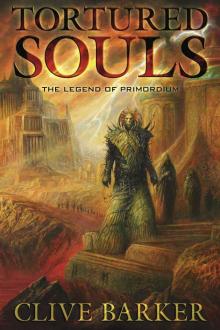 Tortured Souls: The Legend of Primordium
Tortured Souls: The Legend of Primordium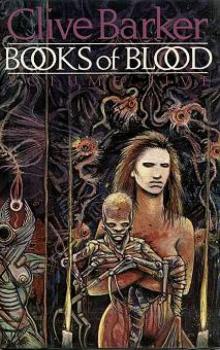 Books of Blood Vol 5
Books of Blood Vol 5 Imajica 02 - The Reconciliator
Imajica 02 - The Reconciliator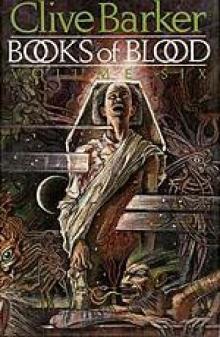 Books Of Blood Vol 6
Books Of Blood Vol 6 Imajica 01 - The Fifth Dominion
Imajica 01 - The Fifth Dominion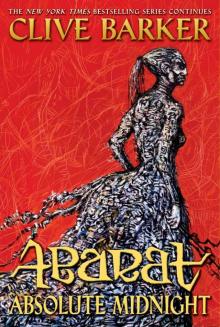 Abarat: Absolute Midnight
Abarat: Absolute Midnight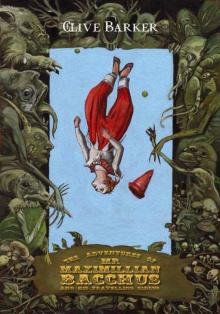 The Adventures of Mr. Maximillian Bacchus & His Traveling Circus
The Adventures of Mr. Maximillian Bacchus & His Traveling Circus Tonight, Again
Tonight, Again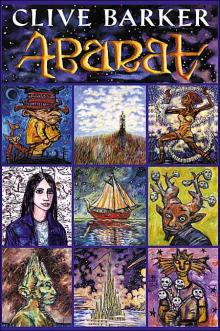 Abarat: The First Book of Hours a-1
Abarat: The First Book of Hours a-1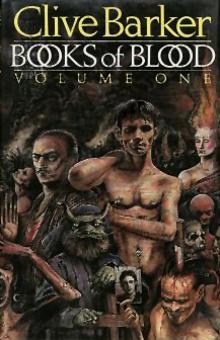 Books Of Blood Vol 1
Books Of Blood Vol 1 Age of Desire
Age of Desire Imajica: Annotated Edition
Imajica: Annotated Edition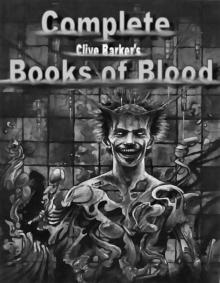 Complete Books of Blood
Complete Books of Blood Gutted: Beautiful Horror Stories
Gutted: Beautiful Horror Stories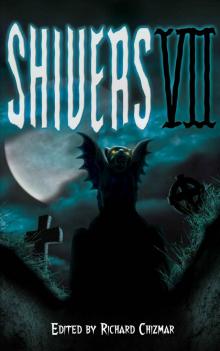 Shivers 7
Shivers 7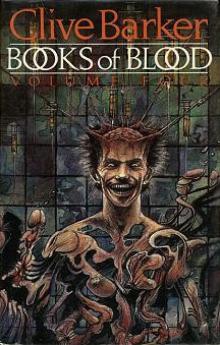 Books Of Blood Vol 4
Books Of Blood Vol 4